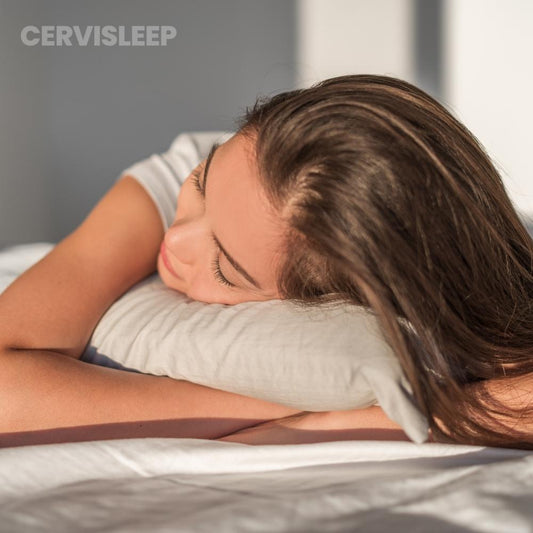Introduction: Why Deep Sleep is Essential
Do you wake up feeling groggy, even after a full night's sleep? You’re not alone. Millions struggle with poor sleep quality, leading to fatigue, brain fog, and even chronic health issues. The key to feeling truly rested isn’t just about how many hours you sleep—it’s about how much deep sleep you get.
Deep sleep is the most restorative sleep stage, helping with muscle recovery, memory consolidation, and overall well-being. In this guide, we’ll explore the science behind deep sleep, why it’s crucial for your health, and how you can optimize your sleep to wake up refreshed every morning.
What is Deep Sleep?
Deep sleep, also known as slow-wave sleep (SWS), is the most restorative stage of sleep. During this phase:
✔️ Muscles repair and grow – Essential for physical recovery.
✔️ Brain detoxes and strengthens memory – Helps with learning and cognitive function.
✔️ Hormones regulate – Growth hormone is released, helping the body heal and rebuild.
Deep sleep typically occurs during the first half of the night and lasts 20-40 minutes per cycle. However, many people struggle to get enough deep sleep due to poor sleep habits, stress, or an improper sleeping environment.
Signs You’re Not Getting Enough Deep Sleep
If you experience any of the following, your deep sleep cycles may be disrupted:
❌ Waking up tired even after 7-9 hours of sleep
❌ Struggling with memory, focus, or mental clarity
❌ Feeling physically weak or sluggish during the day
❌ Getting sick frequently due to a weakened immune system
The good news? You can improve deep sleep naturally by making a few key changes to your sleep routine.
How to Get More Deep Sleep Naturally
1. Optimize Your Sleep Environment
Your bedroom should be a deep sleep sanctuary. Follow these steps:
✅ Use a supportive pillow: A proper cervical pillow keeps your spine aligned, reducing discomfort and restlessness. (Try the CerviSleep™ Premium Cervical Pillow for optimal neck support!)
✅ Keep the room cool: 60-67°F (16-19°C) is the best temperature for deep sleep.
✅ Eliminate noise and light: Blackout curtains, white noise machines, or sleep masks help.
2. Follow a Consistent Sleep Schedule
Your body thrives on routine. Try this:
🔹 Go to bed and wake up at the same time every day—even on weekends.
🔹 Get at least 7-9 hours of sleep to maximize deep sleep cycles.
🔹 Avoid long naps (over 30 minutes) that can interfere with nighttime sleep.
3. Limit Screen Time Before Bed
Blue light from screens suppresses melatonin, making it harder to fall into deep sleep.
🚫 Avoid phones, tablets, and TVs at least 60 minutes before bed.
🌙 Use night mode or blue light-blocking glasses if needed.
4. Reduce Stress Before Sleep
High stress levels increase cortisol, which prevents deep sleep. Try these relaxation techniques:
🧘 Deep breathing or meditation before bed.
📖 Reading a book instead of scrolling on your phone.
💆 Using a lavender-scented sleep spray for relaxation.
5. Improve Your Sleeping Posture
Your sleeping position affects the quality of deep sleep:
✔ Side sleepers – A cervical pillow helps align the spine and relieve pressure.
✔ Back sleepers – A memory foam pillow supports natural neck curvature.
✔ Stomach sleepers – Should avoid using thick pillows to reduce strain.
⭐ Best Solution: CerviSleep™ Premium Cervical Pillow improves deep sleep by providing optimal neck support for any sleeping position.
6. Avoid Late-Night Eating & Caffeine
Your body needs time to digest before sleep. Follow these tips:
❌ No caffeine 6 hours before bedtime.
❌ Avoid heavy, spicy, or sugary foods before bed.
✅ Opt for light snacks like almonds or bananas if hungry.
The Best Pillow for Deep, Restorative Sleep
The right pillow makes a huge difference in your sleep quality. The CerviSleep™ Premium Cervical Pillow is designed to:
✅ Align your spine and neck for better posture.
✅ Relieve pressure points and reduce tossing & turning.
✅ Encourage deeper sleep cycles with ergonomic memory foam.
👉 Wake up pain-free & fully refreshed—Get Yours Today!
Final Thoughts: Make Deep Sleep a Priority
Deep sleep is essential for health, energy, and productivity. By optimizing your sleep environment, routine, and posture, you can unlock deeper, more restorative sleep every night.
Which tip will you try tonight? Let us know in the comments! 💤






